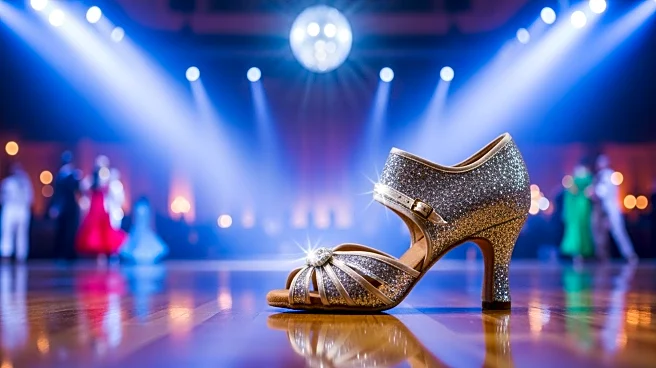What's Happening?
Ellie Goldstein, a model with Down's syndrome, made history by participating in the popular television show Strictly Come Dancing. Goldstein, who danced the Tango to Lady Gaga's 'Abracadabra' with her
partner Vito Coppola, became the first person with Down's syndrome to compete in the show. Despite her elimination during the Halloween-themed episode, her participation was celebrated by many, including Beth Matthews from Swansea, who expressed pride and emotion at Goldstein's performance. Goldstein's involvement in the show is seen as a significant step towards inclusivity in mainstream media, challenging preconceived notions about individuals with Down's syndrome.
Why It's Important?
Goldstein's participation in Strictly Come Dancing is a landmark moment for representation and inclusivity in entertainment. It challenges stereotypes and opens doors for individuals with disabilities in the media industry. By showcasing her talent on a major television platform, Goldstein has provided hope and inspiration to families and individuals with Down's syndrome, demonstrating that they can achieve success in fields traditionally dominated by those without disabilities. This event may encourage more inclusive casting in television and film, promoting diversity and acceptance in society.
What's Next?
Goldstein's participation could lead to increased opportunities for individuals with disabilities in the entertainment industry. Her success may inspire casting directors and producers to consider more diverse talent for roles in television and film. Additionally, Goldstein's journey might encourage other individuals with Down's syndrome to pursue careers in modeling and acting, further breaking down barriers and fostering a more inclusive environment in the arts.
Beyond the Headlines
Goldstein's involvement in Strictly Come Dancing not only highlights the importance of representation but also raises awareness about the capabilities of individuals with Down's syndrome. It challenges societal perceptions and encourages a broader conversation about inclusivity and diversity. This could lead to long-term cultural shifts, where media and entertainment become more reflective of the diverse society they serve.











